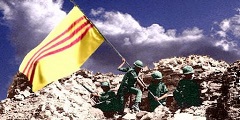Không riêng ǵ phương diện ngoại giao,tất cả sự kiện trên đời này tuỳ thuộc vào ba yếu tố thiên thời, địa lợi và nhân hoà .
Dĩ nhiên sự cậy có sức mạnh để bát nạt.. để chiếm đoạt là
hành vi của kẻ cướp .C̣n việc biểu dương sức mạnh ra cho người ta nh́n mà ngán ḿnh khg dám có mưu đồ ăn hiếp , bắt nạt đó là ḿnh xài nguyên tắc :
« để cũng cố hoà b́nh. phaỉ chuẩn bị chiến tranh »..
Cho nên chuyện chạy đua chế tạo vũ khí bom đạn
là chuyện bắt buộc phải có, c̣n áp dụng đúng hay khg là tuỳ bên nào có tập nịêm "tướng cuớp", bên nào có tập niệm "yêu ḥa b́nh" như Ông Đạo Dừa của chúng ta.
Lấy thí dụ cho vui nhé:
Nh́n cô trong h́nh dưới đây nói lên cái ǵ ?
Nói lên sự kiện cô ta biểu dương sức mạnh ra cho người ta nh́n mà ngán ḿnh khg dám có mưu đồ sờ mó, dê x̣m ..vv
Tức là cô ta đă cũng cố sự hoà b́nh đi đứng đuợc yên thân khỏi bị mấy bàn tay sàm sở làm phiền bằng cách chuẩn bị chiến tranh đề chữ «Hands off» .Nói một cách khác cô ta đă có chuẩn bị để vũ khí trong túi sách tay của cô ta rồi đó nào là dao bấm, nào là Spray canette nào là ..vv và ..vv
Ai mà biết cái ǵ trong túi sách cô ta chứ ....
(cũng như Hirohito đâu biết cái ǵ có trong túi sách Federal Reserve của Mỹ chứ ..Chớ nếu biết có Little Boy hay Fatman ǵ trong đó th́ cho dù gọi hồn của ông Nội Hirohito về xúi đánh Trân Ch Cảng cũng chả dám qúinh nữa)
Nhờ sự cũng cố "chiến tranh" ư quên chuẩn bị "chiến tranh" (biết viết chữ "hands off" ngoài sau mông) mà suốt cả một hành tŕnh cô ta đi trong métro đựơc hoà b́nh .Tức là phe mày râu chỉ có thể dùng mắt nh́n thôi chớ khg thể nào dùng bạo lực quân sự sờ mó được ..như hcm dùng bao lực quân sự sờ mó mông VNCH ..c̣n tụi BH/Red China ngày nay biết thân, biết phận đứng nh́n mông NH/Taiwan nào dám bắt chước Hcm nham nhở đâu ....
Kết luận:
Ḥa b́nh có nơi dương thế .
Tôi đồng ư với anh NMQ .Trên chính trường
(dân chủ), ba tấc lưỡi cũng góp phần làm nên việc.
V́ muốn được lá phiếu của dân đen bầu phải có ba tấc lưỡi tốt , cử tri nghe khaói lổ nhĩ mới bầu chứ .
C̣n trên chính trường độc tài khg cần ba tấc luởi, chỉ cần nhịp roi, bẹo AK ra cho tốt ..Cho nên anh hăy đễ ư xem Ng minh triết đâu cần thiết ba tấc luỡi, ăn nói bậy bạ là thế ..
Trong chính trường dân chủ, tôi nghĩ chính trị gia nào cũng nên lâu lâu xạo ke nhi nhi vài chổ ..
Miễn sao đừng phạm lổi lần lớn của Code D' éthique ...
Làm chính trị mà thật thà quá th́ làm khg được .
Cũng như đi tán gái mà thật thà quá độ th́
làm sao có vợ đây !
Nguời ta nói con gái yêu bằng lỗ tai cũng như dân đen thích lời của chính trị gia bằng lổ tai vậy ..
Thấy một cô gái mắt Lươn, một mí th́ cũng phaỉ làm bộ giả dối khen cô ta :
"ồ, mắt cô tṛn xoe đẹp như mơ..hỏng hiểu tại sao tui càng nh́n càng thích đó .." ..
Tuy cô ta biết khi soi guơng tự nhủ rằng :
- ủa mắt ḿnh hi hí ,sao cha nội đó nói tṛn xoe, kỳ vậy ta ..
Tuy biết "hơi kỳ kỳ" ,anh đó giả dối trong lời nói nhưng c̣n có cảm giác lân lân khoái trong ḷng ..
Chớ thật thà quá nói :
« hứ... thứ có mắt Luơn như hồ chí minh trai thời trộm cướp gái buôn chồng người »
th́ làm sao cô ta khoái nghe đây ..mặc dù biết là lời phê b́nh thât thà ..và chính xác .
Kết luận:
Cô ta vẩn thích (khoái ) sự ăn nói gian dối của anh đầu tiên .. Cho nên ḿnh đừng trách Obama có những chổ nho nhỏ hơi xạo .
Đó là bản tánh cần thiết phải có để vớt hai nhiệm kỳ TT Mỹ .
Cũng như đi cua giai mà thật thà quá độ th́ làm sao có chồng đây !
Thấy một anh có lổ mũi như Chí Tài th́ cũng phaỉ làm bộ làm tịch giả dối khen anh ta :
"ồ, lỗ mũi anh sao có nét Erotica c̣n khiêm luôn nét "ái quốc" nữa ..hỏng hiểu tại sao em càng nh́n anh càng thấy bị thu hút đó .." ..
Tuy anh ta biết khi soi guơng, tự nhủ rằng :
- Mẹ bà nó!! Lổ mũi ḿnh nh́n từa tựa như Đổ 10, bự như trái chanh của Nông D mạnh mà c̣n bầy đặt khen, kỳ vậy ta ..
Tuy biết "hơi kỳ kỳ", cô đó giả dối trong lời nói nhưng c̣n có cảm giác lân lân khoái khoái trong ḷng ..
Chớ nếu cô ta thật thà quá nói :
« hứ... LỔ mũi anh ǵ mà giống y như của Trư bát Giới trong phim bộ Thầy Tam Tạng em coi hà ...»
th́ làm sao anh ta khoái nghe đây ..mà cuới về làm vợ .Cho nên
xác suất ở giá rất cao nếu ăn nói quá thật thà trong lúc cua trai .
Đồng ư .





 Reply With Quote
Reply With Quote


Bookmarks